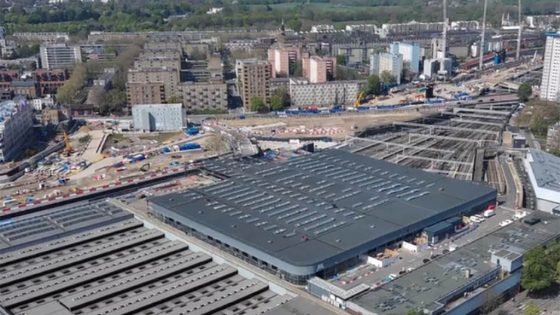The government has written off more than £2bn on the cancelled leg of HS2, accounts reveal.
In its annual report, HS2 Ltd said it lost £2.2bn on the megaproject’s northern leg in the year ending 31 March, £1bn of which it attributed to lost economic benefit following former prime minister Rishi Sunak’s decision in October 2023 to cancel it.
The bulk of these losses – totalling £713m – came from the West Midlands to Crewe section, which the government delayed in March 2023 before cancelling it altogether seven months later.
The public body lost £137m on the planned section from Crewe to Manchester, and £153m on the Euston site (pictured). It was announced in October 2023 that HS2 Ltd would no longer lead the Euston station development.
Most of the Euston design costs incurred between April 2021 and October 2023 related to plans for a 10-platform station. Those costs have been written off, according to the accounts, because the number of platforms has been cut to six.
The other half of the losses – amounting to £1.1bn – relates to spending on the cancelled phase, including design, enabling works, environmental works and preparations for parliamentary bills.
The body also spent £95m on exiting phase two after it was cancelled, including on remediation and safely ceasing activity.
HS2 Ltd, the government body charged with building the high-speed railway, is entirely funded by the Department for Transport (DfT).
Executive chair Jon Thompson wrote: “The government’s decision in October 2023 to cancel phase two of HS2 and deliver a new station at London Euston through private finance has had a big impact on our activities.
“Like all long-term infrastructure projects, we’ve been affected by economic conditions with inflation, instability in the global supply chain and the changes to HS2’s scope making delivery increasingly challenging.
“Unsurprisingly, these factors have driven up the cost of delivery, which was a driving force behind the government’s decision to cancel later phases of the railway.”
The body said it told the DfT in November that costs for phase one had spiralled beyond the available £44.6bn funding package, to somewhere between £49bn and £57bn in 2019 prices. This is higher than the DfT estimate of between £45bn and £54bn.
It also reported that it missed six out of 20 internal milestones for the year, but still expected the first services between Birmingham and Old Oak Common to run between 2029 and 2023.
The report comes days after the government’s spending watchdog estimated that closing sites on the cancelled leg would cost £100m. No major construction work had started on the megaproject’s second phase, but the body has a legal duty to restore sites to their former state.

